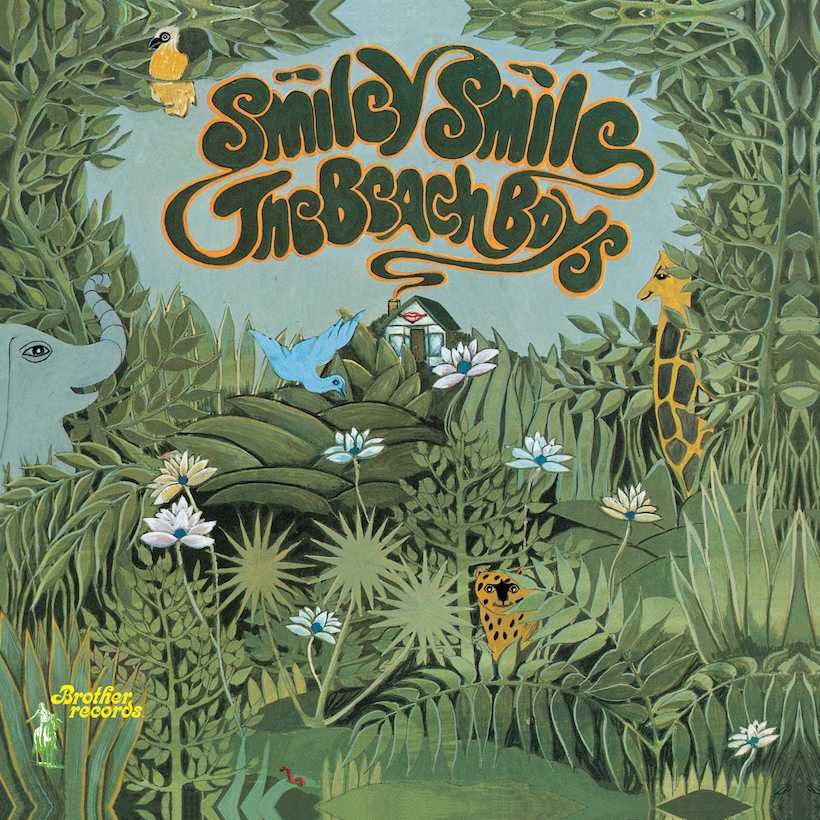How ‘Smiley Smile’ Marked A New Era For The Beach Boys
After ‘Pet Sounds,’ Brian Wilson made a move toward minimalism on The Beach Boys follow-up album ‘Smiley Smile,’ released on September 18, 1967.

By the summer of 1967, The Beach Boys had racked up enough chart-busters to keep them forever lodged among the top hit-makers of the decade. This didn’t come from repeating familiar formulas, but by moving past earlier trends, including surfing, hot-rodding, go-go dancing, and appropriating Phil Spector’s Wall Of Sound as their own. In 1966, The Beach Boys went beyond the latter by spreading out their soundscapes, bringing that type of rock’n’roll into the realm of contemporary soundtrack work by Henry Mancini, Quincy Jones, Elmer Bernstein, and John Barry for the Pet Sounds album.
Group songwriter and producer Brian Wilson then attempted a more light-hearted approach for Smile, an album that was to be released in 1967, but instead would sit on the shelf for over 40 years, to eventually become The Beach Boys’ first Grammy-winning project as a box set. The grandiose productions of both Pet Sounds and Smile began to seem extraneous to Brian Wilson at the time, and despite the lead single, “Good Vibrations,” being the biggest hit in the band’s oeuvre, Wilson left its production ethic behind and moved toward minimalism in order to finish what would become the follow-up to Pet Sounds, entitled Smiley Smile, on September 18, 1967.
A number of factors led Brian Wilson away from the big production sound of his last four albums, but the primary one seems to have been the temporary “theft” of the “Good Vibrations” master tape from storage at the Columbia studios, where the vocals had been finished. To resolve such problems, Wilson began to build a studio right inside his Bel Air home in California.
The Beach Boys’ publicist at the time was Derek Taylor, the famed English provocateur who had created The Beatles’ breakthrough ad campaigns during 1963-64. He described the situation succinctly in a story for World Countdown News, one of the early underground papers that began to show up during 1967:
“[The Beach Boys were able to] restructure the attitude and atmosphere at recording sessions and remove the problem of availability of commercial studios, building their own track studio in the Spanish house. The plan worked. Within days of building the studio and using very few of ‘Heroes And Villains’ and Smile tracks already recorded, Wilson and The Beach Boys could see their new single taking shape. The emotional effect of having their own studio at home was startling. By July 13, the album [re-named Smiley Smile] had been passed to Capitol Records for pressing, and ‘Heroes and Villains’ was on the air.”
The “effect” Taylor spoke of, was reflected immediately in a Hit Parader review of Smiley Smile. “The Beach Boys’ long-long-long-awaited album has at last been released, minus many of the incredible tracks like ‘The Elements’ and ‘Surf’s Up’ that had made it a legend in the music business.” What was left was “a collection of deft, cute vocal exercises with probably more a cappella harmony on any album since the fall of the singing group era in the late 50s”.
The latter comment highlights where Brian Wilson had once again been ahead of the curve. In curtailing the masterwork that was Smile, Wilson also preceded The Beatles’ ‘Get Back’ sessions, The Rolling Stones’ Beggars Banquet, Bob Dylan’s John Wesley Harding, The Band’s Music From Big Pink, and The Mothers Of Invention’s Crusin’ With Ruben & the Jets: all back-to-basics efforts which pulled the plug on over-amplified acid rock in 1968. By the end of 1967, The Beach Boys would release another minimalist effort, Wild Honey, with its unpretentious hit single “Darlin.’”
Well over a decade later, Pete Townsend of The Who mentioned Smiley Smile’s influence in the notes of his demos album Scoop, released in 1983. Lindsey Buckingham of Fleetwood Mac has gone on record many times about the album’s influence on Tusk, noting the fade of “Wind Chimes” in particular as unparalleled in rock. Even during its own time, “Vegetables” was immediately covered by Laughing Gravy in 1967 (crediting “Song from the album Smiley Smile” on their own 45), while alt-rock acts from the 90s onwards have sung the album’s praises, among them Apples In Stereo, Olivia Tremor Control, The High Llamas, Velvet Crush, The Flaming Lips, Mercury Rev, Super Furry Animals, Weezer, and many others. Best of all, Smiley Smile set the table for the last of the 60s Brian Wilson-era Beach Boy albums, Friends and Sunflower.












